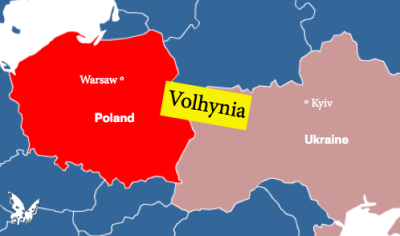Ukraine and Poland Nearer Confederation

All Global Research articles can be read in 51 languages by activating the “Translate Website” drop down menu on the top banner of our home page (Desktop version).
To receive Global Research’s Daily Newsletter (selected articles), click here.
Visit and follow us on Instagram, Twitter and Facebook. Feel free to repost and share widely Global Research articles.
***
Ukrainian President Volodymyr Zelensky has announced he will submit a draft bill to parliament giving special status to Poles in Ukraine. It mirrors and reciprocates a similar bill recently endorsed by Poland. The unprecedented bill grants Ukrainians almost the same rights as Polish citizens, regarding social benefits, education, residence, and so on. Zelensky’s announcement was made during the Polish President Andrzej Duda’s visit to the Ukrainian Parliament on May 22.
In his speech, Zelensky also announced plans for bilateral agreements pertaining to joint border and customs control. Interestingly, he had this to say about Poland:
“Our nations are also brothers (…) and there should be no borders or barriers between us.” He added: “The unity of our nations must last forever”. Given the complex Warsaw-Kiev history, these dramatic statements have certainly raised eyebrows. Andrzej Duda in turn said in his own speech that “the Polish–Ukrainian border should unite, not divide.”
On May 3, Duda had already stated that he hopes one day “there will be no border” between the two countries.
Considering these statements and previous Russian intelligence reports, it is no wonder Maria Zakharova, official representative of the Russian Ministry of Foreign Affairs, has described Zelensky’s plan as “legalizing the Polish takeover of Ukraine.”
Since the beginning of the Russian military operation in Ukraine in February, Polish authorities in Warsaw have been providing Kiev with support and there has been a lot of cooperation. The Russian-Ukrainian conflict has projected Poland – NATO’s largest state member in Eastern Europe – as a strategic player in the region, as it is no stranger to great-power confrontations.
It is thus not far-fetched at all to interpret the initiatives discussed and the rhetoric employed by the two leaders as a kind of first step towards a future Ukrainian-Polish confederation. Such a “merging” scenario, in a very creative way, could thereby “hack” the long process of bringing Kiev into the EU and the Western bloc, a goal which the West clearly pursues by whatever means necessary – as has been indicated by Macron’s recent proposal to create a new and more inclusive European political organization, for instance.
Interestingly, this possible future development would accomplish the same thing a military “annexation” would – and even so might also pave the way for a future Polish peace mission. On April 28, the Russian Foreign Intelligence Service’s director claimed Poland was secretly planning to employ its troops to partly take over Western Ukraine, with American support. The justification for that would be “to defend” the neighboring country from “Russian aggression”. According to Russian intelligence, in late April, this so-called peace mission was being discussed with Biden’s officials and was still under preliminary agreements.
Moreover, Polish officials were supposedly negotiating with members of the Ukrainian elite to change Kiev’s policies by making them more “democratic” and pro-Warsaw, so as to counterbalance its nationalist elements. These data have been reported by the Russian press and such coverage has often been labeled as Russian “propaganda” and “disinformation” by Western media. The Russian intelligence also worried that such a development, if it came to fruition, would actually pave the way for a kind of future “reunification”.
Historically, Western Ukraine was ruled by Poland a number of times, including after the 1921 Riga peace treaty, and anti-Polish feelings are part of Ukrainian nationalism today. While Warsaw has been supporting Kiev in key strategic issues since the 2014 Maidan revolution, the very way both countries perceive and politicize 20 century history has hampered their bilateral relations. During World War II, the Ukrainian Insurgent Army (UPA) cooperated with the Nazi Waffen-SS and several war crimes were commited against Poles. Today’s post-Maidan Ukraine glorifies UPA leader Stepan Bandera and this fact is not well received in Poland.
Here, some older history is relevant. A large part of today’s Ukraine was once dominated by the then Polish-Lithuanian Commonwealth. After 1349, then Ruthenia, which largely corresponds to today’s Western Ukraine, was subjected to foreign domination. By 1569, most of it became Polish territory. The pressures for Polonization, which included converting to Roman Catholicism, the ongoing enserfment of the peasantry by Poland, and the persecution of the Orthodox Church alienated peasants and Cossacks. In 1648, the Cossack leader Bohdan Khmelnytsky led an uprising against the Polish King, founded the Cossack Hetmanate, and was hailed a liberator of the people. In 1654, with the Pereyaslav agreement, this new Cossack state pledged its loyalty to the Russian Tsar. To this day, Khmelnytsky is hailed by some as a Ukrainian national hero and a precursor of nationalism because of his fight against Polish domination – even though some criticize him for his alliance with the Tsar.
Dmytro Yarosh, adviser to the Commander-in-Chief of the Armed Forces of Ukraine Valerii Zaluzhny, stated in an interview on May 27, 2019 that Zelensky would “lose his life” and “hang on a tree on Khreshchatyk” if he “betrayed” Ukrainian nationalists by negotiating an end to the civil war in Donbass. Yarosh is a co-founder of the Right Sector and former commander of the far-right Ukrainian Volunteer Army. Therefore, considering Kiev’s persistent problem with extremist violence and the blatant neo-Nazism of its key Azov battalion, not to mention the complicated Polish-Ukrainian relations historically, one can conclude that Zelensky and Duda’s plans will face some challenges, and could escalate internal tensions dramatically.
*
Note to readers: Please click the share buttons above or below. Follow us on Instagram, Twitter and Facebook. Feel free to repost and share widely Global Research articles.
Uriel Araujo is a researcher with a focus on international and ethnic conflicts.
Featured image is from InfoBrics

